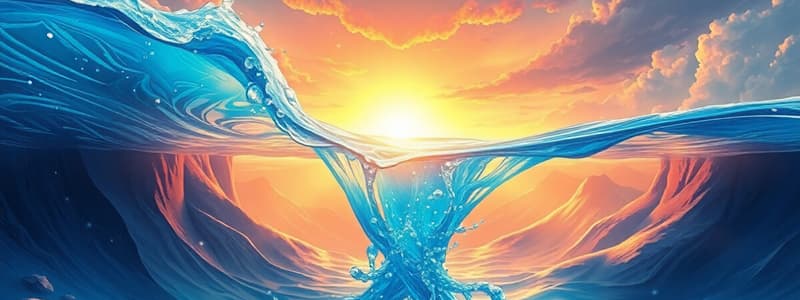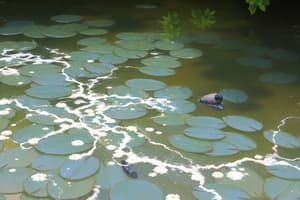Podcast
Questions and Answers
At what temperature does ice begin to melt?
At what temperature does ice begin to melt?
- 100°C
- -1°C
- 32°F
- 0°C (correct)
What effect does anti-fog spray have on water vapor?
What effect does anti-fog spray have on water vapor?
- It freezes the water vapor.
- It repels water completely.
- It prevents water droplets from forming. (correct)
- It evaporates the water vapor.
During the boiling process, what happens to the temperature of water?
During the boiling process, what happens to the temperature of water?
- It remains constant. (correct)
- It fluctuates randomly.
- It decreases steadily.
- It increases steadily.
What is the critical temperature that indicates the boiling point of water?
What is the critical temperature that indicates the boiling point of water?
What happens to the temperature when ice is melting?
What happens to the temperature when ice is melting?
Which apparatus is essential for recording temperature in the experiment?
Which apparatus is essential for recording temperature in the experiment?
What is the purpose of stirring the ice and water before taking thermometer readings?
What is the purpose of stirring the ice and water before taking thermometer readings?
What happens to ice when it is left at room temperature?
What happens to ice when it is left at room temperature?
At what temperature does ice melt into water?
At what temperature does ice melt into water?
Which statement correctly describes the particles in the solid state of water?
Which statement correctly describes the particles in the solid state of water?
Which process describes the change from water to ice?
Which process describes the change from water to ice?
What state of water is described as water vapor?
What state of water is described as water vapor?
What happens to water droplets on the outside of a glass of iced water?
What happens to water droplets on the outside of a glass of iced water?
Which of the following is NOT a state of water?
Which of the following is NOT a state of water?
How does spraying mists into the air help lower the surrounding temperature?
How does spraying mists into the air help lower the surrounding temperature?
What happens to water when it melts?
What happens to water when it melts?
At what temperature does water transition from a liquid to a gas during boiling?
At what temperature does water transition from a liquid to a gas during boiling?
Which of the following processes involves the release of energy?
Which of the following processes involves the release of energy?
Why do our hands feel cooler when we rub alcohol on them?
Why do our hands feel cooler when we rub alcohol on them?
What is the primary reason mists from a spraying machine lower surrounding temperatures?
What is the primary reason mists from a spraying machine lower surrounding temperatures?
Which statement is true regarding the energy changes during evaporation?
Which statement is true regarding the energy changes during evaporation?
What is the correct independent variable when graphing the temperature of water against time?
What is the correct independent variable when graphing the temperature of water against time?
During the freezing process of water, what is occurring?
During the freezing process of water, what is occurring?
What occurs at the melting point of ice?
What occurs at the melting point of ice?
During the melting process, what happens to the temperature of ice?
During the melting process, what happens to the temperature of ice?
What characteristic of crushed ice contributes to its faster melting compared to cubed ice?
What characteristic of crushed ice contributes to its faster melting compared to cubed ice?
What change occurs to water when it reaches the boiling point?
What change occurs to water when it reaches the boiling point?
What happens to the temperature of water when it is cooled to the freezing point?
What happens to the temperature of water when it is cooled to the freezing point?
How should the y-axis be labeled in the graph of temperature against time?
How should the y-axis be labeled in the graph of temperature against time?
Which of the following statements about energy during phase changes is accurate?
Which of the following statements about energy during phase changes is accurate?
At what temperature does water boil and change into steam?
At what temperature does water boil and change into steam?
What process involves the change of water from a liquid to a gas below its boiling point?
What process involves the change of water from a liquid to a gas below its boiling point?
Which of the following describes the change from steam to water?
Which of the following describes the change from steam to water?
Which of the following statements is incorrect regarding freezing?
Which of the following statements is incorrect regarding freezing?
What effect does sunlight have on rainwater on the road?
What effect does sunlight have on rainwater on the road?
What is the primary reason for glasses fogging up when leaving an air-conditioned space?
What is the primary reason for glasses fogging up when leaving an air-conditioned space?
Which state change is described as occurring at or below the boiling point?
Which state change is described as occurring at or below the boiling point?
Which process converts ice directly into water vapour without passing through the liquid state?
Which process converts ice directly into water vapour without passing through the liquid state?
Flashcards
Freezing
Freezing
The process of water changing from a liquid to a solid state at 0°C (32°F).
Boiling
Boiling
The process of water changing from a liquid to a gas state at 100°C (212°F).
Evaporation
Evaporation
The process of water changing from a liquid to a gas state at temperatures below its boiling point.
Condensation
Condensation
Signup and view all the flashcards
What is the difference between boiling and evaporation?
What is the difference between boiling and evaporation?
Signup and view all the flashcards
Water Vapor
Water Vapor
Signup and view all the flashcards
What is the boiling point of water?
What is the boiling point of water?
Signup and view all the flashcards
What is the freezing point of water?
What is the freezing point of water?
Signup and view all the flashcards
Independent variable
Independent variable
Signup and view all the flashcards
Dependent variable
Dependent variable
Signup and view all the flashcards
Line graph
Line graph
Signup and view all the flashcards
Melting point
Melting point
Signup and view all the flashcards
Boiling point
Boiling point
Signup and view all the flashcards
Energy absorbed during state change
Energy absorbed during state change
Signup and view all the flashcards
Energy released during state change
Energy released during state change
Signup and view all the flashcards
Surface area
Surface area
Signup and view all the flashcards
States of Matter
States of Matter
Signup and view all the flashcards
States of Water
States of Water
Signup and view all the flashcards
Melting
Melting
Signup and view all the flashcards
Melting
Melting
Signup and view all the flashcards
Freezing Point
Freezing Point
Signup and view all the flashcards
Energy Absorption
Energy Absorption
Signup and view all the flashcards
Particles in Solids
Particles in Solids
Signup and view all the flashcards
Particles in Liquids
Particles in Liquids
Signup and view all the flashcards
Energy Release
Energy Release
Signup and view all the flashcards
Anti-fog Spray
Anti-fog Spray
Signup and view all the flashcards
Temperature Change During State Changes
Temperature Change During State Changes
Signup and view all the flashcards
Practical 2.1: Heating Ice to Steam
Practical 2.1: Heating Ice to Steam
Signup and view all the flashcards
Skill Builder 2.1: Drawing Line Graphs
Skill Builder 2.1: Drawing Line Graphs
Signup and view all the flashcards
Study Notes
Change in States of Water
- Water exists in three states: solid (ice), liquid (water), and gas (water vapor).
- The mist-spraying machine lowers surrounding temperature by spraying water mist into the air, causing evaporation.
- Evaporation is the change from liquid to gas. It occurs at temperatures below boiling point.
- Melting is the change from solid to liquid. Ice melts at 0°C (freezing point).
- Freezing is the change from liquid to solid. Water freezes at 0°C (melting point).
- Boiling is the change from liquid to gas. Water boils at 100°C (boiling point).
- Condensation is the change from gas to liquid. Steam (water vapor) condenses to form water when cooled.
- Temperature remains constant during changes of state. Energy is either absorbed from or released to the surroundings.
Processes of Change in Water
- Water exists in three physical states: solid (ice), liquid (water), and gas (water vapor).
- The physical states are characterized by the arrangement of water particles.
- Solid particles are closely packed in a regular pattern. Liquid particles are closely packed, but not arranged regularly. Gas particles are far apart.
Practical 2.1: Heating Ice to Steam
- Aim: To study the change in temperature when ice is heated to steam.
- Apparatus/materials: Alcohol thermometer, beaker, Bunsen burner, insulating mat, tripod, wire gauze, gas lighter, stand/clamp, crushed ice,
- Procedure: Set up the apparatus, make sure the alcohol thermometer does not touch the bottom of the beaker, light the Bunsen burner, record thermometer readings every minute, turn off the burner after water boils for two minutes, stir the water/ice before taking temperature readings
- Results: Record time (min) and temperature (°C) in a table.
- Discussion:
- When ice melts, temperature does not change.
- When water boils, temperature does not change.
- Graph: Draw a line graph of temperature against time, using results obtained.
Skill Builder 2.1: Drawing Line Graphs
- Line graphs show the relationship between two variables.
- Steps for drawing a line graph:
- Title the graph.
- Place independent variable on x-axis, dependent variable on y-axis.
- Choose a suitable scale for the graph axes, using the available space.
- Mark the points (data from the table) on the graph.
- Connect the points with a line or a smooth curve.
Skill Practice 2.1
- Procedure: Repeat experiment in practical with water/ice, record time (min) and temperature (°C).
- Draw a line graph of temperature against time.
- The graph shows the change of temperature in ice and water when heated or cooled.
Additional Notes
- Anti-fog sprays contain chemicals that prevent water droplets from forming on surfaces, instead allowing the water to condense into a thin water film.
- Alcohol feels cool when rubbed on the skin due to its quick evaporation, which absorbs energy from the skin.
Studying That Suits You
Use AI to generate personalized quizzes and flashcards to suit your learning preferences.




